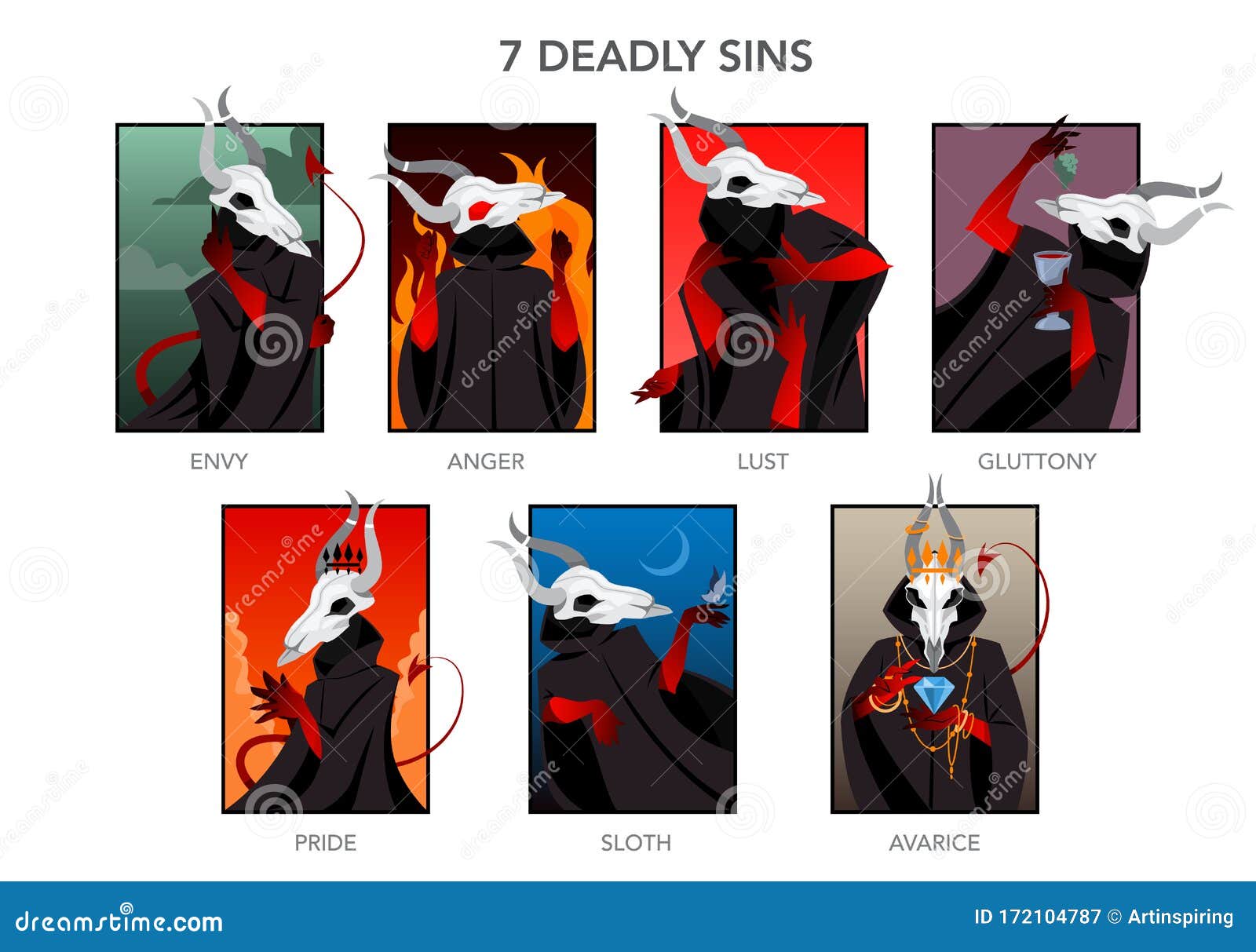Does The Bible Talk About The Seven Deadly Sins? A Deep Dive
Does the Bible talk about the seven deadly sins? Well, buckle up because this is a question that’s been debated for centuries, and it’s not as straightforward as you might think. The Bible, being the ancient and sacred text that it is, contains layers of teachings, parables, and warnings that touch on human behavior. But are the seven deadly sins—pride, greed, lust, envy, gluttony, wrath, and sloth—explicitly mentioned? Let’s find out. If you’re here, chances are you’re curious about the intersection of theology and morality, and that’s exactly what we’ll explore today.
Now, before we dive headfirst into the scriptures, let’s set the stage. The seven deadly sins have become a cultural phenomenon, inspiring everything from movies to memes. But their origins are deeply rooted in Christian tradition, and while the Bible doesn’t list them in one neat package, the concepts behind them are definitely present. Think of it like a puzzle where the pieces are scattered throughout the text, waiting for us to put them together.
So, whether you’re a devout believer, a curious seeker, or just someone who loves digging into the mysteries of religion, this article is for you. We’ll break it down step by step, exploring the biblical basis for these sins, their implications, and why they matter in today’s world. Let’s get started!
- Unleashing The Magic Of Moviespapa Your Ultimate Movie Streaming Companion
- Would Squid Game Be Legal Exploring The Reality Behind The Global Phenomenon
Table of Contents
- The Origins of the Seven Deadly Sins
- Does the Bible Talk About the Seven Deadly Sins?
- Pride: The Root of All Evil
- Greed: The Love of Money
- Lust: The Desires of the Flesh
- Envy: The Green-Eyed Monster
- Gluttony: Excess in All Forms
- Wrath: The Fire Within
- Sloth: The Sin of Indifference
- The Seven Deadly Sins in Modern Times
- How to Combat These Sins
- Wrapping It Up
The Origins of the Seven Deadly Sins
Let’s rewind for a moment and talk about where the idea of the seven deadly sins actually comes from. Contrary to popular belief, the concept didn’t originate in the Bible itself. Instead, it was developed by early Christian theologians, most notably Evagrius Ponticus in the 4th century and later refined by Pope Gregory the Great in the 6th century. These guys were basically trying to categorize human failings into a neat little list so that people could better understand and combat their own weaknesses.
Now, you might be wondering why this matters. Well, the reason is simple: while the Bible doesn’t explicitly list the seven deadly sins, it does address each of them individually. Think of it like a playlist where the songs are scattered across different albums, but they all share a common theme. Theologians took these scattered themes and compiled them into a list that became the foundation for much of Christian moral teaching.
So, what does this mean for us? It means that while the Bible might not say “here are the seven deadly sins,” it definitely has a lot to say about the behaviors and attitudes that make up the list. Let’s take a closer look.
- Hdhub4you Your Ultimate Destination For Highquality Entertainment
- Allmovieshub Your Ultimate Streaming Destination Unveiled
Does the Bible Talk About the Seven Deadly Sins?
Alright, let’s tackle the big question: does the Bible talk about the seven deadly sins? The short answer is yes—but not in the way you might expect. Instead of giving us a tidy list, the Bible addresses these sins in various passages, often through parables, warnings, and teachings from Jesus and the prophets.
For example, when Jesus talks about the judgment of nations in Matthew 25, he emphasizes the importance of compassion and righteousness. Or when the Apostle Paul warns against the “works of the flesh” in Galatians 5:19-21, he lists behaviors like envy, anger, and drunkenness. These teachings all point to the same core ideas behind the seven deadly sins.
Here’s the thing, though: the Bible doesn’t just tell us what not to do—it also shows us how to live differently. Through the examples of Jesus and the teachings of the apostles, we’re given a roadmap for overcoming these sins and living a life of purpose and meaning. Let’s break it down further by looking at each sin individually.
Pride: The Root of All Evil
Pride, often considered the deadliest of the seven sins, is all about thinking you’re better than you actually are. In the Bible, pride is seen as the root of all other sins because it leads to a distorted sense of self-importance. Think about the story of Adam and Eve in Genesis. Their decision to eat the forbidden fruit wasn’t just about disobedience—it was about thinking they knew better than God.
Other examples of pride in the Bible include King Nebuchadnezzar, who boasted about his power and was humbled by God (Daniel 4), and the Pharisees, who prided themselves on their righteousness but missed the point of the law (Matthew 23). The Bible makes it clear: pride goes before a fall, and humility is the key to true greatness.
Here’s a quick list of Bible verses about pride:
- Proverbs 16:18 – “Pride goes before destruction, a haughty spirit before a fall.”
- James 4:6 – “God opposes the proud but gives grace to the humble.”
- 1 Peter 5:5 – “Clothe yourselves, all of you, with humility toward one another, for ‘God opposes the proud but shows favor to the humble.’”
Greed: The Love of Money
Greed is all about wanting more than you need, and it’s a sin that shows up time and time again in the Bible. Think about the story of the rich young ruler in Mark 10. He came to Jesus asking how he could inherit eternal life, but when Jesus told him to sell all his possessions and give to the poor, he walked away sad because he had great wealth. The love of money, as Paul says in 1 Timothy 6:10, is the root of all kinds of evil.
But it’s not just about money. Greed can manifest in many forms—power, status, even relationships. The Bible warns us to be content with what we have and to trust in God’s provision. Here are a few verses to consider:
- Matthew 6:24 – “No one can serve two masters. Either you will hate the one and love the other, or you will be devoted to the one and despise the other. You cannot serve both God and money.”
- Ecclesiastes 5:10 – “Whoever loves money never has enough; whoever loves wealth is never satisfied with their income.”
- Hebrews 13:5 – “Keep your lives free from the love of money and be content with what you have, because God has said, ‘Never will I leave you; never will I forsake you.’”
Lust: The Desires of the Flesh
Lust is one of those sins that gets a lot of attention, and for good reason. It’s all about the pursuit of pleasure, often at the expense of others or ourselves. In the Bible, lust is closely tied to the idea of coveting—wanting something that doesn’t belong to you. Think about the tenth commandment in Exodus 20:17, which says, “You shall not covet your neighbor’s house. You shall not covet your neighbor’s wife, or his male or female servant, his ox or donkey, or anything that belongs to your neighbor.”
Jesus takes this even further in the Sermon on the Mount, saying in Matthew 5:28, “But I tell you that anyone who looks at a woman lustfully has already committed adultery with her in his heart.” The message is clear: lust isn’t just about physical actions—it’s about the thoughts and desires that lead to those actions.
So, how do we combat lust? The Bible encourages us to focus on purity of heart and mind, to guard our thoughts, and to seek God’s help in overcoming temptation. Here are a few verses to keep in mind:
- 2 Timothy 2:22 – “Flee the evil desires of youth and pursue righteousness, faith, love and peace, along with those who call on the Lord out of a pure heart.”
- 1 Corinthians 6:18 – “Flee from sexual immorality. All other sins a person commits are outside the body, but whoever sins sexually, sins against their own body.”
- Ephesians 5:3 – “But among you there must not be even a hint of sexual immorality, or of any kind of impurity, or of greed, because these are improper for God’s holy people.”
Envy: The Green-Eyed Monster
Envy is that feeling of resentment when someone else has something you want. It’s a sin that shows up in many Bible stories, from Cain and Abel to Joseph and his brothers. In each case, envy leads to conflict, betrayal, and even violence. The Bible warns us that envy is not just harmful to others—it’s also destructive to ourselves.
Think about the Apostle James, who writes in James 3:16, “Where you have envy and selfish ambition, there you find disorder and every evil practice.” Envy creates division and chaos, both in our relationships and in our own hearts. The antidote? Contentment, gratitude, and a focus on God’s plan for our lives.
Here are a few verses to reflect on:
- Proverbs 14:30 – “A heart at peace gives life to the body, but envy rots the bones.”
- Galatians 5:26 – “Let us not become conceited, provoking and envying each other.”
- 1 Corinthians 13:4 – “Love is patient, love is kind. It does not envy, it does not boast, it is not proud.”
Gluttony: Excess in All Forms
Gluttony isn’t just about overeating—it’s about indulging in anything to excess. Whether it’s food, drink, entertainment, or even work, gluttony is about losing control and letting our desires rule us. The Bible warns against this kind of excess in many places, urging us to live with moderation and self-control.
For example, in Proverbs 23:20-21, Solomon writes, “Do not join those who drink too much wine or gorge themselves on meat, for drunkards and gluttons become poor, and drowsiness clothes them in rags.” The message is clear: overindulgence leads to ruin, both physically and spiritually.
So, how do we avoid gluttony? The Bible encourages us to practice discipline, gratitude, and mindfulness. Here are a few verses to consider:
- Proverbs 25:16 – “If you find honey, eat just enough—too much of it, and you will vomit.”
- Philippians 4:5 – “Let your gentleness be evident to all. The Lord is near.”
- 1 Corinthians 6:12 – “‘I have the right to do anything,’ you say—but not everything is beneficial. ‘I have the right to do anything’—but not everything is constructive.”
Wrath: The Fire Within
Wrath, or anger, is a powerful emotion that can quickly spiral out of control. In the Bible, anger is seen as dangerous when it’s unchecked, but it’s also acknowledged as a natural response to injustice. The key is learning how to manage our anger and channel it in healthy ways.
Think about Jesus in the temple, overturning the tables of the money changers (John 2:13-17). His anger was righteous indignation, directed at those who were exploiting others. But the Bible also warns us against letting anger get the better of us. In Ephesians 4:26-27, Paul writes, “‘In your anger do not sin’: Do not let the sun go down while you are still angry, and do not give the devil a foothold.”
- Dubbed Movies The Ultimate Guide To A World Of Entertainment
- Kim K Diddy Tapes The Inside Story Youve Been Waiting For

Seven Deadly Sins Set. Christian Bible Character Stock Vector

Seven Deadly Sins Wallpaper HD WallpaperSafari

The Seven Deadly Sins Gets New Trailer and Screenshots Ahead of Western